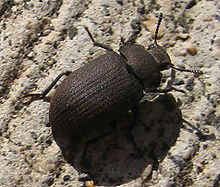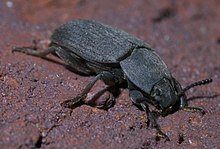Opatrini is a tribe of darkling beetles (Tenebrionidae) in the subfamily Tenebrioninae.[1][2][3]
| Opatrini | |
|---|---|

| |
| Gonocephalum adpressiforme | |
| Scientific classification | |
| Domain: | Eukaryota |
| Kingdom: | Animalia |
| Phylum: | Arthropoda |
| Class: | Insecta |
| Order: | Coleoptera |
| Family: | Tenebrionidae |
| Subfamily: | Blaptinae |
| Tribe: | Opatrini Brullé, 1832[verification needed] |
| Subtribes | |
| |
| Diversity | |
| at least 120 genera | |

In research by Kamiński et al. published in 2021, Opatrini and six other tribes were moved from Tenebrioninae to a newly resurrected subfamily,Blaptinae. These tribes contained 281 genera and about 4000 species, about 50% of Tenebrioninae. The new classification was followed by Bouchard et al. the same year.[4][3]
Eupachypterus is a fossil genus of Opatrini, known from Oise amber found in Ypresian deposits of France, dating from more than 50 million years ago. It was already quite similar to some existing Opatriini, such as Neopachypterus and Pseudolamus.
See also
editReferences
edit- ^ "Opatrini tribe Information". BugGuide.net. Retrieved 2021-08-08.
- ^ Bousquet, Yves; Thomas, Donald B.; Bouchard, Patrice; Smith, Aaron D.; et al. (2018). "Catalogue of Tenebrionidae (Coleoptera) of North America". ZooKeys (728): 1–455. Bibcode:2018ZooK..728....1B. doi:10.3897/zookeys.728.20602. PMC 5799738. PMID 29416389.
- ^ a b Bouchard, Patrice; Bousquet, Yves; Aalbu, Rolf L.; Alonso-Zarazaga, Miguel A.; et al. (2021). "Review of genus-group names in the family Tenebrionidae (Insecta, Coleoptera)". ZooKeys (1050): 1–633. Bibcode:2021ZooK.1050....1B. doi:10.3897/zookeys.1050.64217. hdl:10261/250214. PMC 8328949. PMID 34385881.
- ^ Kamiński, Marcin; Lumen, Ryan; Kanda, Kojun; Iwan, Dariusz; et al. (2021). "Reevaluation of Blapimorpha and Opatrinae: addressing a major phylogeny-classification gap in darkling beetles (Coleoptera: Tenebrionidae: Blaptinae)". Systematic Entomology. 46 (1): 140–156. Bibcode:2021SysEn..46..140K. doi:10.1111/syen.12453. S2CID 224888924.
Further reading
edit- LeConte, J. L. (1861). Classification of the Coleoptera of North America. Smithsonian Miscellaneous Collections. Vol. 3. Smithsonian Institution. doi:10.5962/bhl.title.38459. ISBN 978-0665100550.
- Somerby, Ronald E.; Thomas, Donald B.; Triplehorn, Charles A. (2002). "Family 106: Tenebrionidae". In Arnett, Ross H. Jr.; Thomas, Michael C.; Skelley, Paul E.; Frank, J. Howard (eds.). American Beetles, Volume II: Polyphaga: Scarabaeoidea through Curculionoidea. CRC Press. pp. 463–509. ISBN 978-0-8493-0954-0.
External links
edit- Media related to Opatrini at Wikimedia Commons